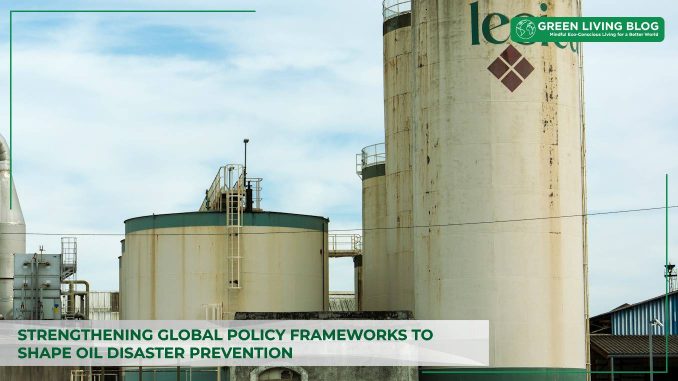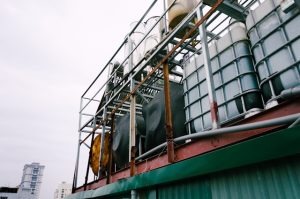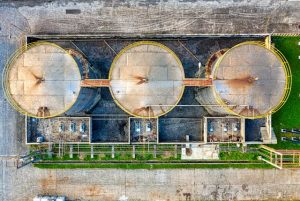
In recent years, oil disasters have increased, with spills polluting oceans, harming marine life and damaging local economies. These incidents can devastate ecosystems, often taking years to recover fully. Comprehensive global policies are essential to prevent future disasters.
Aligning these measures with sustainability principles and green living can reduce oil dependency, minimize environmental risks, and ensure a healthier planet for future generations.
Pushing for stricter standards and supporting eco-friendly initiatives contribute to creating a cleaner, safer world where green businesses can thrive.
Current Challenges in Oil Disaster Prevention

International and national regulations govern oil spill responses, including protocols set by the International Maritime Organization through the MARPOL convention. National laws like the U.S. Oil Pollution Act impose financial liabilities on companies responsible for spills and mandate response plans.
Despite these measures, 2022 witnessed seven oil spills worldwide, including three significant incidents involving over 700 tons of oil. Such events highlight the continuing vulnerabilities in current frameworks.
Current regulations often need more funding and vigorous enforcement. Some enterprises cut corners due to inadequate penalties and oversight, compromising their preparedness and response capacity. The global framework lacks consistency, and policies will remain fragmented and ineffective without comprehensive reforms.
You can see how stronger regulations, increased funding and stringent enforcement are crucial for efficient oil spill prevention. They ensure businesses are accountable and implement preventive measures that align with sustainability goals.
Importance of Global Policy Frameworks
Preventive measures like stricter offshore drilling and oil transportation regulations are crucial in reducing spill risks. For example, the U.S. Environmental Protection Agency requires facilities storing over 1,320 gallons above ground to implement a Spill Prevention, Control and Countermeasure Plan.
This plan compels facilities to identify spill risks, install appropriate containment systems and outline emergency responses. Additionally, regulating oil transport with modern safety standards and regular inspections ensures organizations address potential leaks and spills before they cause significant damage.
Fostering a culture of corporate responsibility among oil brands is equally important. Incentivizing the adoption of green practices like clean energy technologies can minimize environmental risks and align with sustainability principles.
You can encourage this shift by supporting policies that reward organizations for reducing their carbon footprint, or investing in spill-proof storage and transport systems. When they recognize the long-term value of protecting the environment, they integrate preventive measures into their operations. This approach contributes to a safer and healthier planet.
Policy Innovations for Improved Disaster Response

Emerging policies increasingly focus on rapid response strategies to minimize the impact of oil disasters. New technologies — like remote sensing for real-time spill detection and advanced robotics for underwater repairs — significantly enhance response times. The collaboration between governments and tech companies is crucial for developing these solutions.
International cooperation also plays a vital role. For instance, the U.S. recently provided $10 million to support UN efforts. The project aims to offload 1.14 million oil barrels from the decaying Safer oil tanker in the Red Sea to prevent a catastrophic oil spill. These efforts ensure faster and more effective response mechanisms by leveraging global expertise and pooling resources.
Community-based response programs and local stakeholder involvement further strengthen these strategies. When you involve local brands, indigenous groups, and businesses in planning and implementing response measures, you gain invaluable insights into the region’s specific needs and vulnerabilities.
This localized approach builds trust, ensures response efforts align with local priorities and increases the likelihood of success. Supporting emerging policies that combine global resources with grassroots involvement shapes a resilient framework that minimizes the risks and impacts of oil disasters.
Benefits for Green Living and Sustainable Business
Robust global policies can significantly protect marine ecosystems and local economies by enforcing stringent regulations that minimize the risk of oil spills. Marine life is especially vulnerable, as organisms can ingest or inhale oil, or suffer from external exposure. It can lead to internal damage, or severe skin and eye irritation. Establishing comprehensive frameworks encourages green innovation in the energy sector.
You can support new technologies that reduce oil spill risks or improve rapid response strategies. Doing so creates opportunities for sustainable spill-prevention technology and cleanup efforts, which protect biodiversity, and safeguard the livelihoods of local communities that rely on fishing and tourism.
Unified Global Policies in Preventing Oil Disasters
Global regulations are crucial to preventing oil disasters because they establish consistent safety standards and streamline international response efforts. Supporting these measures helps protect oceans, ecosystems, and local economies from the devastating effects of oil spills.
![]()
Author Profile
- Online Media & PR Strategist
- Blogger and Educator by Passion | Senior Online Media & PR Strategist at ClickDo Ltd. | Fascinated to Write Lifestyle Blogs in News & Education I have completed a journalism summer course at the London School of Journalism and manage various blogs.
Latest entries
 Green Expert GuidesMarch 28, 2025Lisbon Living: Where Sustainable Charm Meets Urban Energy
Green Expert GuidesMarch 28, 2025Lisbon Living: Where Sustainable Charm Meets Urban Energy EnvironmentJanuary 21, 2025Buying Eco-Friendly Homes: 6 Eco Questions to Ask Your Real Estate Agent
EnvironmentJanuary 21, 2025Buying Eco-Friendly Homes: 6 Eco Questions to Ask Your Real Estate Agent BusinessJanuary 16, 202510 Benefits of used Office Furniture when Refurbishing an Office
BusinessJanuary 16, 202510 Benefits of used Office Furniture when Refurbishing an Office Best practicesJanuary 6, 2025Eco-Friendly Event Planning: Mastering Sustainable Waste Management for Holiday Celebrations
Best practicesJanuary 6, 2025Eco-Friendly Event Planning: Mastering Sustainable Waste Management for Holiday Celebrations






Leave a Reply
You must be logged in to post a comment.